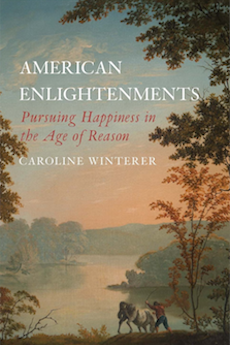By Louis J. Kern
In American Literary History, Robert A. Ferguson observed that “the Enlightenment has been an overtly partisan concept in American historiography, one in which subsidiary notions of liberalism, progress, and rationality have shaped the character of historical reconstruction.” Winterer develops that insight in her revisionist consideration of the complexities and contradictions of the Enlightenment.
She argues that enlightenment was an ongoing process; there were multiple enlightenments that addressed problems of religion, civilization, government, and of human nature. Lacking unity, it offered no specific political program; rather, it was “a process of becoming, a way of imagining the relationship of the present to the past” that envisioned progress towards a future that would achieve political stability and thereby human happiness. As a virtually global intellectual movement, enlightenments linked the intellectual centers of London and Paris with the peripheries of empire, and specimens, books, persons, and ideas flowed back and forth. The concept of an “American Enlightenment’’ is ahistorical since Americans were not mere recipients of European thought but active participants in the quest for enlightened understanding, providing unique information and physical specimens that moved intellectual debates in Europe forward.
Yet, while Americans were interactively engaged with European thought and embraced instrumental rationality, they remained unsure about their own conclusions and whether they had found a true path to enlightenment. Nowhere were they more conflicted than in matters of religion and race. While the very foundation of the nation lay in a radically secular deistic vision asserting that humans governed themselves not through faith but reason, by 1800 republican government became firmly linked to Christianity, “a particularly American fusion”; evangelical religion had claimed a moral vision for the future nation.
Attitudes towards Native Americans and African slaves were especially troubling in enlightenment thought. Americans viewed the Aztecs and perhaps the Mound Builders of the Mississippi Valley as “enlightened” and likely civilized peoples as contra European claims of New World degeneracy. But they considered North American Indians as savages unrelated to earlier Inhabitants, facilitating their removal or elimination. Although enlightened Americans might be either pro or anti-slavery, the three-fifths clause of the Constitution showed no such ambivalence. While Winterer correctly points out that enlightenment was not a universal acclamation of freedom, she overlooks the longer shadow of enlightenment thought on slavery.
By the 1820s and 30s, cotton cultivation had spread to the southwestern frontier of Alabama and Mississippi. Slavery in that context was a thoroughly rational, modern, and economically progressive system that provided the basis for the rise of modern capitalism and the first American industrial revolution. It was also the cruelest and most brutal labor system of its time. This was the product of rationality and the drive for progress that enlightenment championed. It embodied Habermas’ observation that the Enlightenment began in hope of freedom but ended in theories of repression.
As for an “American Enlightenment,” Winterer argues that that construction dates from the era of the Bicentennial and has served as hagiographic reverence for the Founding Fathers and a claim of exceptionalism. Nevertheless, she demonstrates that in the nineteenth century “enlightenment” became “coterminous with the broad objectives of American civilization and Manifest Destiny.”
On the whole, Winterer’s work affords a salutary and thought provoking revisionist consideration of the intellectual environment of the nation’s founding and the ambiguities and quandaries its founding figures faced as they sought to create a more progressive social and political order that would ensure societal happiness. It is widely informed and offers unusual insights into the varieties of Enlightenment thought that reinforce current concerns about the darker side of that movement revealed in the twentieth century.
Louis J. Kern (ΦBK, Clark University,1965) is professor emeritus of history at Hofstra University. Hofstra University is home to the Omega of New York chapter of Phi Beta Kappa.




